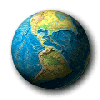
A Democratic World
Commonwealth
The word 'Nation' needs to be re-defined. Formerly the word described a distinctive group of people of common origin and language, with a unique culture developed through a period of common history. In times of limited travel nations took their character from living in a specific geographical region, often becoming visibly different from other races in many ways as well as being distinct in social and religious ideas.
When a nation by some circumstance became powerful in numbers, war making, technology, or inspired by religious zealor just plain arrogance, that nation absorbed and controlled other nations. This is called 'Empire-Building', which is another name for enslavement, the direct opposite of Democracy. The forms of government that arose from empire-building all have a an undemocratic basis.
Nations today should be redefined as Peoples. The people of most modern modern democracies are multinational. This is the result of 19th and 20th Century empire-building, and is today the main cause of strife within countries. Usually the original, most numerous, or most powerful 'nation' considers the country is 'theirs' and others who are recognizably different are interlopers and should be despised.
Racism takes many forms, from the outright physical violence of ethnic cleansing to complete disregard of existence. The position the people people of a country take on this racism scale depends on its history and the history of the despised group within that country.
We tend to believe that the attainment of democracy is the main aim of political endeavour of a country. However, democracy is only the most successful of various ways to build a civilized society. This is because the democratic way can allow all the people of a country to reach that high level of intellectual, social, and cultural development called 'Civilization'.
Is a Constitution a 'good thing'? Democratically speaking, it probably is, whether it is unwritten as in Britain, newly contrived as in Canada, or the product of 18th and 19th Century politics as in the USA. Whatever type of constitution we have, it should simply state that citizens must recognize the right of every member of our society to be accepted as a fellow human being no matter in what way he or she may be different from ourselves.
Nations, or Peoples, who call themselves 'democratic' are attempting to meet this ideal. Those nations ruled by autocratic power have not yet set out on the way to Democracy. Thus a distinction can be made between two kinds of nations - the democratic and the non-democratic.
The U.N. was set up after World War II by gathering every group of people that called itself a nation into one world body. It has had some successes, but it has failed to come to grips with the challenge of spreading the idea of Democracy throughout the world. The strong-arm tactics of NATO (the U.N. with bombs) has possibly created a nation state of Kosova. Its people will probably be completely ethnic Albanians. Will it become a medieval nation state or find its way into the Democratic 21st Century?"
Many undemocratic countries are in the U.N. It is time to scrap it and replace it with an alliance of democratic nations. A possible name for this alliance is The Democratic World Commonwealth.
To become a part of this Commonwealth, a nation would have to have a popularly elected government with a constitution guaranteeing democratic freedoms to its people. Entry would establish equality of status in the D.W.C.
The rules governing this body would be simple:
The cost of membership is a percentage of the Gross National Product.
Trade is free among members. No trading may be done with non-members.
This is the carrot and the stick to encourage the spread of Democracy.
All contact would be severed between the Commonwealth and
non-member states. i.e. Air, sea and land travel would not be encouraged to or
from non-member states.
Each member of the Alliance would make a non-aggression pact with all other
members. This would allow national defence forces to be abolished. Instead, a
Commonwealth Defence Force, based in the various member countries, would
serve to protect members anywhere in the world against attacks by militaristic
non-members.
Poor countries of the Commonwealth would be given assistance from a
Development Fund created by taking a percentage of the GNP of the richer
members. Special consideration would be given to democracies surrounded
or vulnerable to attack by non-members.